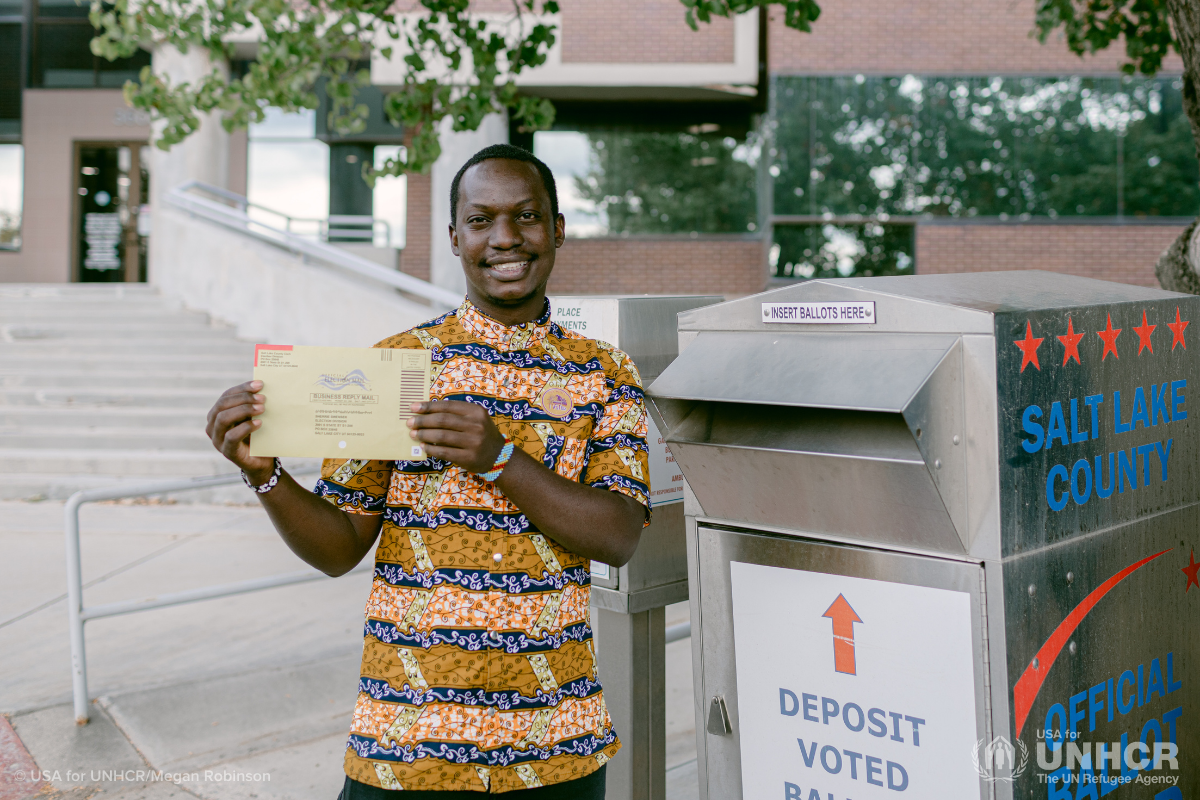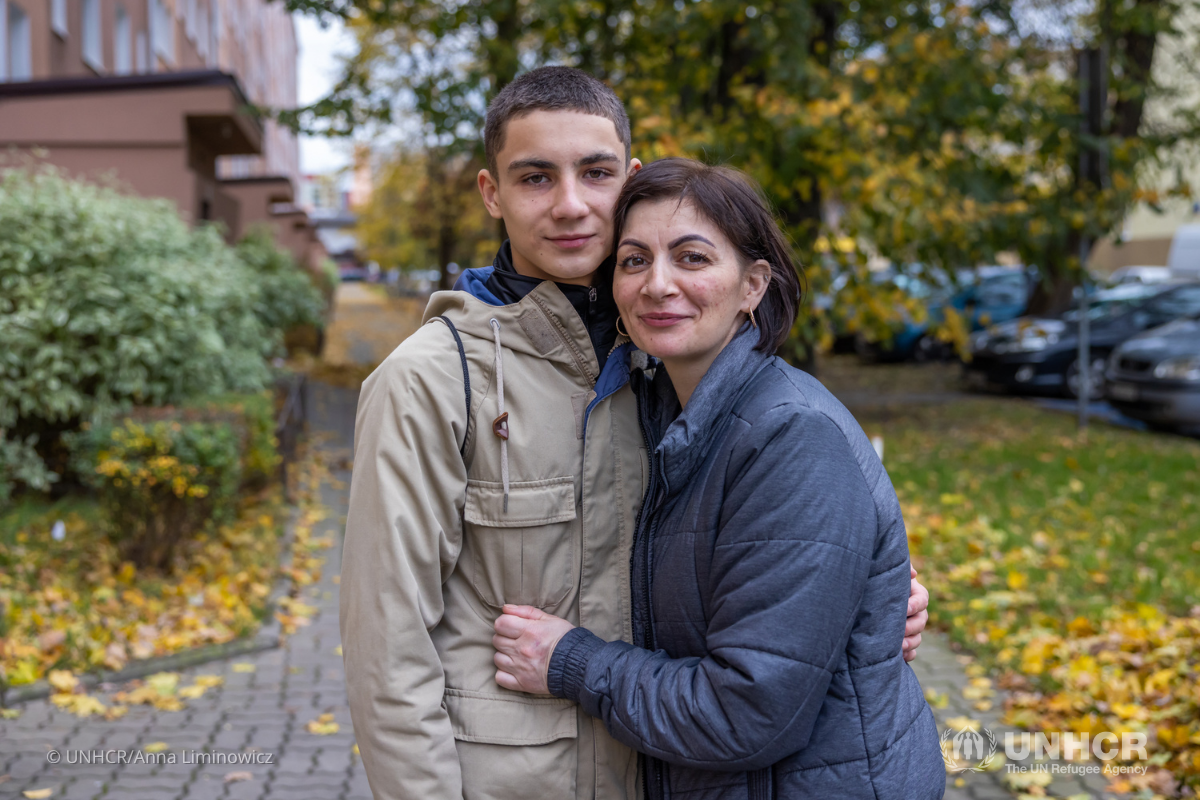Former refugee, new American citizen, first time voter

Fiston Mwesige is a former refugee originally from the Democratic Republic of the Congo who became a citizen of the United States in June 2020. Fiston is the founder of Umoja Generation, a Salt Lake City based non-profit that supports newly resettled refugee children with education and life skills mentorship. Fiston is also a college senior at the University of Utah studying Political Science and Computer Science.
USA for UNHCR Communications Manager Nicholas Feeney sat down with Fiston to talk about his experience as a refugee, how he made Salt Lake City his new home, about becoming a citizen and about his excitement for voting in the upcoming election.
Can you share some background of your refugee experience? Why did your family flee?
My family is originally from the Democratic of the Congo, the Ituri province. This is where, even right now, there is a lot of violence. I'm from the Hema tribe and the Lendu tribe was targeting us. It was very violent, very brutal. My family and others managed to flee and reached the border of Uganda and stayed in a refugee camp for almost five years.
You were just 13 when you were forced to flee, can you share how life was in the camp? Did you go to school?
We didn't have much hope [in the camp]. We didn’t think too much about the future. There were a lot of refugee students and a school nearby but we needed a scholarship. Only maybe 10 or 15 refugees were picked. I was lucky to get a sponsorship and to go to school. But the school didn’t have all the resources.
You were in the camp for about 5 years, then you found out you were approved for resettlement, how did that feel?
If you’ve won lottery, you would really understand that kind of feeling. You don't know what is in the future but you’re leaving the difficulties of the life in the refugee camp. When you get resettled, you don't know where you are going, but it feels like you have hope and at least something can be better.
Your family was approved for resettlement and then you found out you were going to the United States and Utah, what did you think about that?
I didn't have any idea about Utah and when you're outside of America, you really have a different idea of what it is. I knew movies from America, so this is where I had my ideas, like ‘oh wow, America is really tough.’ And when you come here you find it's totally different.
What most surprised you when you arrived to Salt Lake City?
I really loved the people, the community. The sense of giving, of volunteerism. That idea of supporting when someone is in need, because we had so many people who came over who helped us. I remember, it was very cold [when we arrived] and people brought us jackets and boots, just the spirit of giving, that spirit of supporting. Yeah, that was really surprising to me and the people were very nice.
Can you share why you wanted to become a citizen of the United States?
When I resettled in the United States, I didn’t just want to live here, but I wanted the opportunity also to become a United States citizen. I thought, I've been a refugee. I've been called a refugee for all of my life. Now, I get the opportunity of being called American, not a refugee anymore. So yes, I took that opportunity and it was one of the greatest.
What was the process of becoming a citizen like?
First of all, you have to be in the country at least five years and then apply, pay the application fees and then you wait to hear back from United States Citizenship and Immigration Services(USCIS).
When USCIS gets back to you, you schedule to have your fingerprints taken. Then an interview. After the interview, there is a written part to make sure you know English and there are also a hundred questions on American history that you must know.
Once you pass, USCIS reviews everything and records everything. Then the fun part is when you get sworn in, and there is a judge who swears you in. You sing the Pledge of Allegiance, and now you become a U.S. citizen. Now I have another family of more than 300 million people. That's really amazing, that's really great.
Now that you are a citizen, you can vote. How does that make you feel?
Oh, my God I can't wait to vote! I really can't wait to vote and I'm so excited. I've been involved in the community a lot. I know issues that are really affecting us in Salt Lake City.
Exercising my right, my responsibility, and my duty as a citizen — that's why I'm voting. I'm not someone who doesn't care. No. I really care and I want to make my community better. That's why I’m so excited about voting.
More than just voting, you’re also volunteering on a local campaign in Salt Lake City. Can you tell me about your role?
I will be a liaison for the refugee and immigrant community. Helping with registration, also reaching out to people and showing them how it's really important to vote and not to get discouraged because maybe thinking one vote can't really make difference. Mine, yours, and all of us can make a difference, as long as we go out and do something.
You’ve been actively involved in the Salt Lake community years before becoming a citizen. Can you tell me about your non-profit organization Umoja Generation and how you started it?
When I resettled here all I wanted to do was go to school and to contribute to my community. The Umoja Generation is a program that really supports students, mostly refugee and immigrant students who are struggling. There are a lot of resources in Salt Lake City but if you don't have the proper guidance, it is hard. But if you have proper guidance, like a mentor, who can show you, who has been through it themselves, you're going to make it. We have helped close to a thousand students now. Some of them are already in college, some of them will finish college next spring, so we are really excited about that.
Do you have any political heroes that inspire you?
Someone who really inspires is Nelson Mandela. He grew up in a segregated society, and with his integrity and love of the people, he accepted to sacrifice all his life just to better others. He was a great lawyer and could have gained any job and made a lot of money, and be very good for himself, but he refused all of that. Just with his integrity, I feel he contributed a lot. Even through today, Mandela didn't die, Mandela lives in us.
What your future plans and dreams?
So future dreams, I would love to get involved in government and try to at least to contribute, to play my part, in any way. I'm aiming for the Department of State, because I have international experience and the organization is aligned with my experiences and with my background. I had an internship with them, we'll see how it all goes. And also, maybe in the UN.
How can you help...
Join Fiston in voting this election day! As a national, nonpartisan organization we want to help American citizens like you fulfill your civic duty. At the USA for UNHCR Civic Action Center, you can register to vote, look up your candidates, find your voting location and more.


